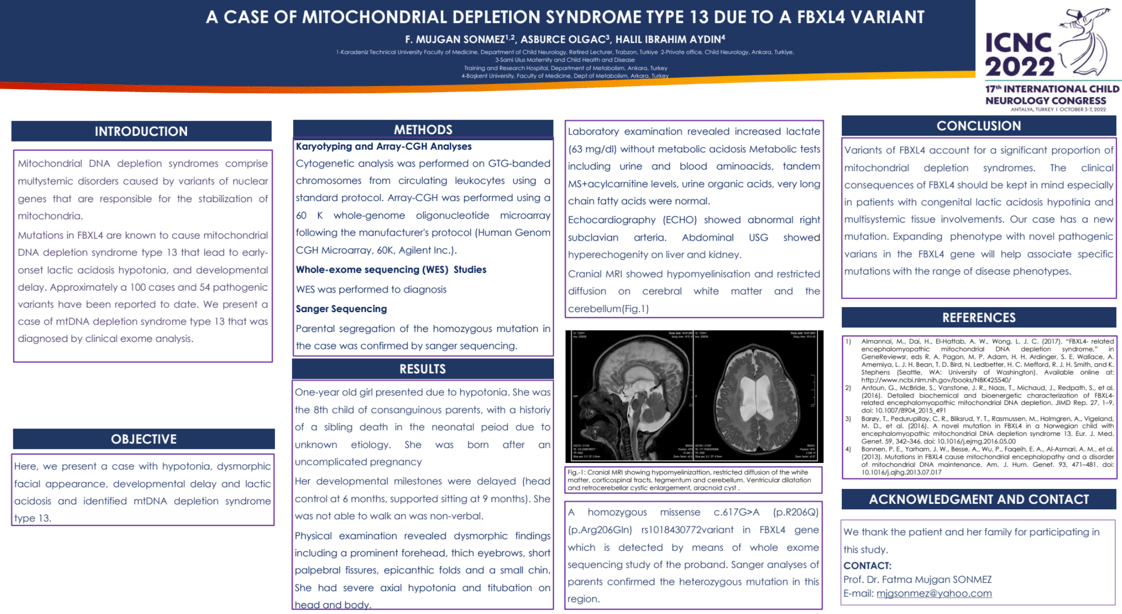A case of mitochondrial depletion syndrome type 13 due to a FBXL4 variant
Asburce Olgac, Halil İbrahim Aydın , Fatma Müjgan Sönmez
A case of mitochondrial depletion syndrome type 13 due to a FBXL4 variant
Objectives: Mitochondrial DNA depletion syndromes comprise multystemic disorders caused by variants of nuclear genes that are responsible for the stabilization of mitochondria. Mutations in FBXL4 are known to cause mitochondrial DNA depletion syndrome type 13 that lead to early-onset lactic acidosis hypotonia, and developmental delay. Approximately a 100 cases and 54 pathogenic variants have been reported to date. We present a case of mtDNA depletion syndrome type 13 that was diagnosed by clinical exome analysis.
Case presentation: One-year-old girl patient presented due to hypotonia. She was the 8th child of consanguinous parents, with a history of a sibling death in the neonatal period due to unknown etiology. She was born after an uncomplicated pregnancy. Her developmental milestones were delayed (head lift at 6 months, supported sitting at 9 months). She was not able to walk an was non-verbal. Physical examination revealed dysmorphic findings. She had severe axial hypotonia. Laboratory examination revealed increased lactate (63 mg/dl) without metabolic acidosis. Metabolic tests were inconclusive. Cranial MRI revealed hypolyelinisation and restricted diffusion of cerebral white matter and the cerebellum. Clinical exome analysis revealed a homozygous p.Arg206Gln variant in FBXL4 that was classified as highly pathogenic in various databases.
Conclusion: Variants of FBXL4 account for a significant proportion of mitochondrial depletion syndromes. The clinical consequences of FBXL4 should be kept in mind especially in patients with congenital lactic acidosis and multisystemic involvement. Expanding the phenotype with novel pathogenic variants in the FBXL4 gene will help associate specific mutations with the range of disease phenotypes.
Keywords: Mitochondrial depletion syndromes, FBXL4, lactic acidosis, hypotonia
Asburce Olgac
Dr. Sami Ulus Children's Hospital
Turkey
Halil İbrahim Aydın
Baskent University
Turkey
Fatma Müjgan Sönmez
KTU Medical Faculty, Department of Chil Neurology
Turkey
A case of mitochondrial depletion syndrome type 13 due to a FBXL4 variant
Objectives: Mitochondrial DNA depletion syndromes comprise multystemic disorders caused by variants of nuclear genes that are responsible for the stabilization of mitochondria. Mutations in FBXL4 are known to cause mitochondrial DNA depletion syndrome type 13 that lead to early-onset lactic acidosis hypotonia, and developmental delay. Approximately a 100 cases and 54 pathogenic variants have been reported to date. We present a case of mtDNA depletion syndrome type 13 that was diagnosed by clinical exome analysis.
Case presentation: One-year-old girl patient presented due to hypotonia. She was the 8th child of consanguinous parents, with a history of a sibling death in the neonatal period due to unknown etiology. She was born after an uncomplicated pregnancy. Her developmental milestones were delayed (head lift at 6 months, supported sitting at 9 months). She was not able to walk an was non-verbal. Physical examination revealed dysmorphic findings. She had severe axial hypotonia. Laboratory examination revealed increased lactate (63 mg/dl) without metabolic acidosis. Metabolic tests were inconclusive. Cranial MRI revealed hypolyelinisation and restricted diffusion of cerebral white matter and the cerebellum. Clinical exome analysis revealed a homozygous p.Arg206Gln variant in FBXL4 that was classified as highly pathogenic in various databases.
Conclusion: Variants of FBXL4 account for a significant proportion of mitochondrial depletion syndromes. The clinical consequences of FBXL4 should be kept in mind especially in patients with congenital lactic acidosis and multisystemic involvement. Expanding the phenotype with novel pathogenic variants in the FBXL4 gene will help associate specific mutations with the range of disease phenotypes.
Keywords: Mitochondrial depletion syndromes, FBXL4, lactic acidosis, hypotonia
Asburce Olgac
Dr. Sami Ulus Children's Hospital
Turkey
Halil İbrahim Aydın
Baskent University
Turkey
Fatma Müjgan Sönmez
KTU Medical Faculty, Department of Chil Neurology
Turkey

Asburce Olgac
Dr. Sami Ulus Children's Hospital Turkey
Dr. Sami Ulus Children's Hospital Turkey